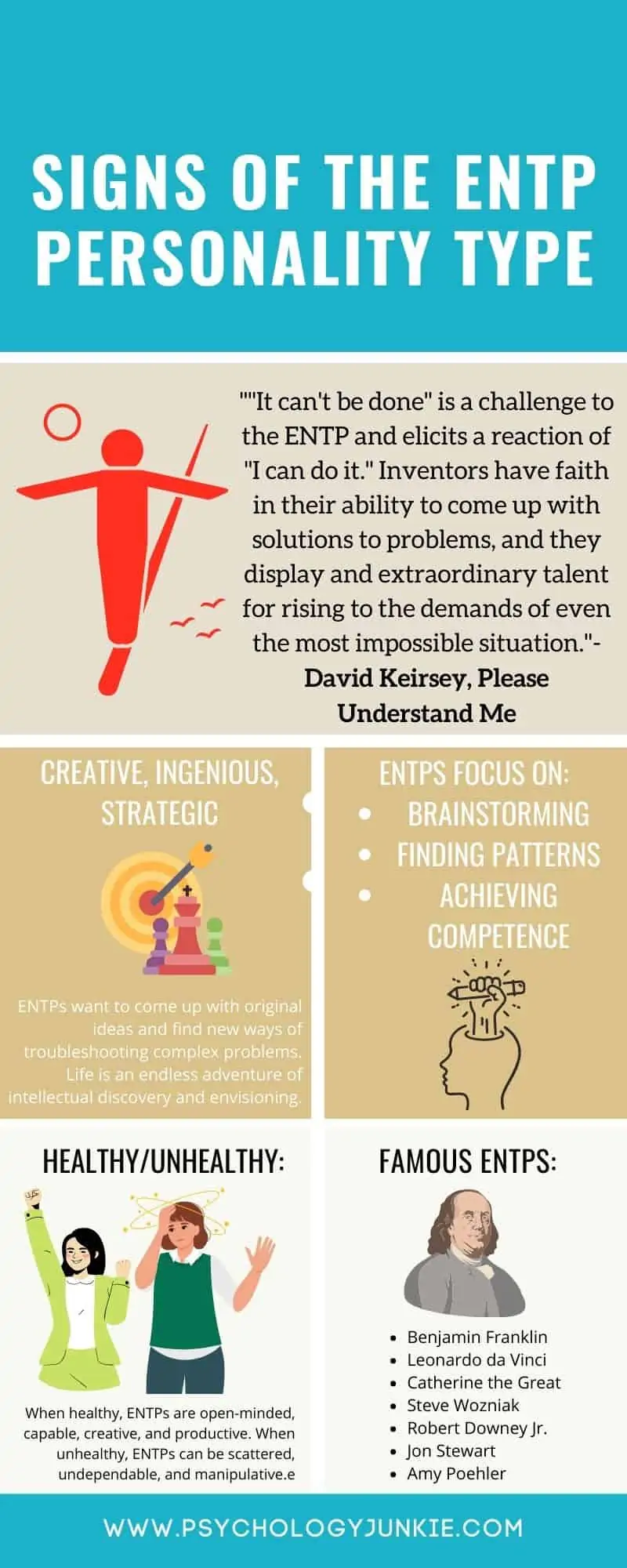24 Signs That You’re an ENTP, the Trailblazer Personality Type
Have you ever wondered which Myers-Briggs® personality type fits you best? Perhaps you’re torn between two types and you’re trying to narrow it down. In today’s article we’re looking at some of the most common characteristics of the ENTP personality type. My hope is that this article can help you to clarify your type or else understand someone else who has ENTP type preferences. If you identify with this type, you’re one of only 4.3% of the population, according to a national sample in the MBTI® Manual.
Not sure what your personality type is? Try out our most highly recommended personality questionnaires:

- You can take our free personality questionnaire here
- You can take Personality Hacker’s highly accurate personality questionnaire.
- You can take the official Myers-Briggs Type Indicator® for $49.95
This article contains an affiliate link to a questionnaire on Personality Hacker. If you purchase one of their courses, I get a small kickback that I can use to pay for hosting and other demands of this site. I only recommend courses I love.
24 Signs That You’re an ENTP, the Trailblazer Personality Type
#1 – You Are Driven by Vision and Possibility
Carl Jung said of the extraverted intuitive type, “The intuitive function is represented in consciousness by an attitude of expectancy, by vision and penetration.” (366) As an ENTP, you naturally look for an inspiring vision to pull you forward. The endless search for possibilities, ideas, and opportunities keeps you motivated to push through any hardship.
#2 – You Get Restless When Life is Routine
You are stimulated by new information and new experiences. When life gets routine you can’t feed your intuition any more data to spark new ideas. Jung says, “When Extraverted Intuition is the dominant function, every ordinary situation in life seems like a locked room which intuition has to open. It is constantly seeking fresh outlets and new possibilities in external life. In a very short time every existing situation becomes a prison for the intuitive, a chain that has to be broken.” (367). Jung also states that, “Because he is always seeking out new possibilities, stable conditions suffocate him.” For you as an ENTP, a life of routine, predictability, and stability can feel draining and uninspiring.
#3 – Creating Ideas is More Inspiring Than Follow-Through
As an ENTP you enjoy creating new ideas. In fact, you could probably create a dozen new ideas spontaneously given a single prompt! The hard part for you is to take the ideas and turn them into tangible results. Doing the nitty-gritty follow-through and gruntwork of creating a vision can be annoying, because in the time it’s taken to start work on your idea, a dozen other newer ideas have already come to your mind! Again, we reference Carl Jung who said, “If only he could stay put, he would reap the fruits of his labours; but always he must be running after a new possibility, quitting his newly planted fields while others gather in the harvest.” (369)
#4 – You See Patterns Others Are Blind To
You naturally spot patterns, ripple-effects, or connections that are not obvious to others. Dario Nardi, a neuroscience expert who has studied brain-mapping in relation to typology, states that ENTPs have a “Christmas tree pattern” in their mind. “Cognitively, this pattern is called trans-contextual thinking. Regardless of what kind of stimulus enters the brain – be it a sight, sound, smell, sensation, or so forth – the brain responds by rapidly processing that stimulus in multiple regions, including regions seemingly not applicable to the stimulus. For example, for most people, hearing the words “dog” and “cat” will evoke auditory regions and perhaps some visual or memory regions. Perhaps we recall a beloved childhood pet. However, the Ne types (ENTPs and ENFPs) get busy using all regions to tap relationships across situations, perhaps suddenly imagining a story about two brothers, one of whom is faithful and sociable (like a dog) while the other is independent and quiet (like a cat).” (Neuroscience of Personality, 98)
#5 – You Enjoy Understanding Systems and Models
You have a natural affinity for understanding models, systems, and frameworks. Because you blend your intuition with an introverted thinking process, you enjoy categorizing and refining information in your mind. While others see a flurry of brainstorming and ideating, internally you’re always refining information into the neatest, most detailed categories possible. Models and systems are fascinating to you because you can organize them neatly in your brain and see how each item in the system connects to another. As an intuitive, you especially enjoy theoretical models and systems (typology itself is a great example of a theoretical model or framework).
#6 – You’re Ceaselessly Curious
Your unquenchable curiousity is one of your greatest strengths. You’re always interested in learning new things and discovering how the world works. Your curiosity is never satisfied with what you already know, so you often jump from one interest to another as each one becomes familiar and your thirst for knowledge deepens.
#7 – You Admire Competence and Intelligence
Sure, everyone admires competence and intelligence to a degree. But as an Intuitive-Thinking type, these two traits are core drivers. The quest for knowledge and mastery of any subject is a never-ending journey. You admire people who are knowledgeable and competent in their field, especially if they are able to articulate the concepts in an interesting way that isn’t too insular or lacking in imagination.
#8 – You’re a Natural Skeptic
Questioning and being skeptical comes naturally to you, and unfortunately this can land you in hot water with the people you care about. You have the ability to look at any situation from multiple angles and perspectives, and you rarely accept things at face value. Your skepticism is often seen as being critical or lacking in trust, but it’s actually more of a thought-out analytical process that allows you to weigh up all the facts and perspectives before coming to a conclusion.
#9 – You Get Bored Easily
Your acute intellect and natural curiosity can sometimes get you into trouble, especially when it comes to boredom. If something stops being interesting or stimulating after a while, you’ll often move on without looking back. It’s not that you don’t care, it’s just that your mind needs to be constantly engaged and stimulated in order to stay interested. As an ENTP, this can lead to jumping between projects or interests more often than is normal for the rest of the population.
#10 – You Love Solving Problems
You’re a problem solver at heart, and you get great satisfaction from finding creative solutions to complex issues. You use your natural skills of intuition and logic to identify patterns in the data or information that others may not see. Your thirst for knowledge and mastery of any subject also helps when it comes to tackling problems head-on. You’re always looking for a challenge and relish the opportunity to show off your skills.
#11 – You Get a Rush From Making People Happy
Even though you’re a Thinker and stereotypes would imply you don’t *care* how people feel, you’re actually quite aware of others’ emotions. As an ENTP you have a process called Extraverted Feeling (Fe) in the tertiary position in your cognitive function stack. This function absorbs other peoples’ feelings and notices social dynamics and interplay. You’re gifted at reading people and crave positive feeling and connection. When you can make someone else smile or laugh you get a rush of satisfaction. At the same time, you may also enjoy toying with the emotional dynamics in the room if things are getting too boring – easing tensions in one regard or riling them up in a witty debate.
#12 – Spontaneity is the Name of the Game for You
You live for spontaneous adventures, and you’re often the one pushing your friends or family to take a leap of faith. You thrive off of unpredictability and surprise, and you’re usually up for just about anything. Your enthusiasm can be contagious, as long as people don’t get too overwhelmed by your energy – which can happen sometimes.
#13 – You Find Schedules Confining
You don’t believe in living your life by a schedule. Even though you may eventually have to stick to one, deep down it feels like a form of imprisonment. This could be because you’re naturally impulsive and often find yourself at the mercy of your own sudden whims. A strict routine makes it hard for your mind to wander, which is why you prefer to leave some room for spontaneity and openness in your life.
#14 – When You’re Deeply Stressed, You Brainstorm to Burnout
When you’re deeply stressed, you naturally lean on your intuition to solve the problem at hand. You brainstorm, try to generate possibilities, look at things from new angles, or think outside the box. However, if there is no “fix” that you can think of, you may suddenly flip a switch and develop a feeling of tunnel vision. It’s as if all your normal possibilities have gone dim and you can only see one or two options in front of you. You become fixated on your body, memories of past failures, or concerns over your health. Your future seems dim and all the windows of opportunity you would normally see have gone dark.
There are ways to get yourself out of this stage, and you can read more about that in our article about type and stress.
#15 – You Enjoy Including People
You enjoy getting people involved in activities, opportunities, and ideas. Sharing your energy and enthusiasm with others gives you a sense of satisfaction and purpose. Whether you’re arguing, exploring possibilities, or completing a project, you like collaborating and working with other people.
#16 – You Want People’s Buy-In
You don’t like to command people and tell people what to do. You’d rather convince and persuade people to join your project or goal. Getting people’s buy-in and having their enthusiastic support is the important thing.
#17 – You Like to Try Things in Unconventional Ways
Doing things the tried-and-true way is boring to you. You’d rather play with ideas and solutions, coming up with new and unusual ways of doing things. You’re a master of improvisation and like to explore alternative ways to get things done. This can cause some people to get impatient with you – after all, they’ve given you one “easy” solution. But for you, the joy is in the exploration more than reaching the destination.
#18 – You Love Venturing Into Abstract Territory
The world of abstract ideas and concepts is like fertile ground to you. You love exploring theoretical possibilities, imagining grand schemes, and philosophizing about life’s biggest questions. Your brain seems to be wired for this type of activity and it makes you feel alive in a way that nothing else can match.
#19 – You Get Bored with Small Talk
You know that small talk is often the social lubricant that helps people feel comfortable together, but it’s generally your least favorite part of a conversation. You’d rather get right down to the interesting stuff – what’s going on in the world, intellectual interplay, science, history, culture – anything that puts your brain into overdrive and lets you engage with the world at large.
#20 – Logical Consistency Matters to You
You care about all your arguments and beliefs having logical foundations. You root out your ideas for any loopholes, fallacies, or mistakes in reasoning. It’s a matter of pride for you to ensure that everything you think makes sense, and it can often lead people to see you as a little pedantic.
#21 – You Crave Independence
Freedom is a core need of your personality type. You don’t want to feel beholden to or reliant on anyone and the mere idea of it can send shivers down your spine. When you imagine the future (which you do quite a lot) you want to see boundless possibilities and unencumbered exploration.
#22 – You Like to take Risks
You have an appetite for risk that can be a bit concerning to some of your more conservative friends. You love the thrill of a good risk, and you’re not afraid to shake things up in pursuit of a goal or vision. As a Thinking type you still weigh the pros and cons in a situation, but you’re not afraid of an entrepreneurial risk or a job that involves less security but more opportunities for growth, advancement, or freedom.
#23 – You Love Warmth and Emotional Connection
You have a mental process called Extraverted Feeling (Fe) as the tertiary function in your cognitive function stack. When Fe is in the tertiary position it craves warmth, positivity, and emotional affirmation from others. John Beebe, the father of the 8-function model of typology, states that the tertiary function shows how you want to be taken care of. ENTPs and ESTPs who both have tertiary Extraverted Feeling crave a sense of warmth, connection, and good feeling between themselves and others. Sometimes they can overlook the need for this kind of connection in their quest to find truth or mastery, but it’s always there at the back of their minds and surfacing from time to time.
#24 – You Have a Quick Sense of Humor
ENTPs love to laugh, and their often-wry sense of humor can be a source of joy for everyone around them. You like to observe the world and find the oddity and randomness in things, which then become fodder for your witty jokes and stories. Sometimes your humor can offend the more sensitive types, but your heart is usually in the right place.
What Are Your Thoughts?
Do you relate to these signs? Do you have any thoughts or experiences to share? Let us know in the comments!
Find out more about your personality type in our eBooks, Discovering You: Unlocking the Power of Personality Type, The INFJ – Understanding the Mystic, The INTJ – Understanding the Strategist, and The INFP – Understanding the Dreamer. You can also connect with me via Facebook, Instagram, or Twitter!
Other Articles You Might Enjoy:
Sources:
Psychological Types by Carl Jung
Building Blocks of Personality Type by Leona Haas and Mark Hunziker
Exploring Essential Motivators by Linda V. Berens
Depth Typology – The Guide Map to Becoming Who We Are by Mark Hunziker
Neuroscience of Personality by Dario Nardi
MBTI® Manual: A Guide to the Development and Use of the Myers-Briggs Type Indicator® Instrument
Subscribe to Our Newsletter

Want to discover more about personality type? Get the inside scoop with Susan Storm on all things typological, along with special subscriber freebies, and discounts on new eBooks and courses! Join our newsletter today!














Wow!
I was all of them except 22! I couldn’t believe it that the personality type is this much specific! I always thought it’s just something to make people busy…
But now i believe in it!
I am f…ckin ENTP 🎉🎉🎉🎉🎉
Tnx for this amazing article ☺️
OMG. Thank You! Thank you! Thank you! This one was worth waiting for. I’m so glad you completed this list cuz you nailed it. So spot on. Thanks.
Wow!
First time I’m reading something really depicting who I am. Nice piece! I will, however, love to see another masterpiece on how the weaknesses of this personality can be improved soonest. Thanks!